Sarasvathy’s Seminal Article: A Novel Perspective on New Venture Development
VerifiedAdded on 2023/06/17
|7
|1898
|229
AI Summary
This essay evaluates the significance of Sarasvathy’s seminal article in entrepreneurship research and its novel perspective on new venture development. It critically evaluates the view that causation and effectuation are major elements that serve as the basis to develop a new venture or establishment. The essay also discusses the modern entrepreneurial idea and concepts that are seen as concept-driven and the Lindblom’s model that is one of causation reasoning in modern era.
Contribute Materials
Your contribution can guide someone’s learning journey. Share your
documents today.

Business
Secure Best Marks with AI Grader
Need help grading? Try our AI Grader for instant feedback on your assignments.
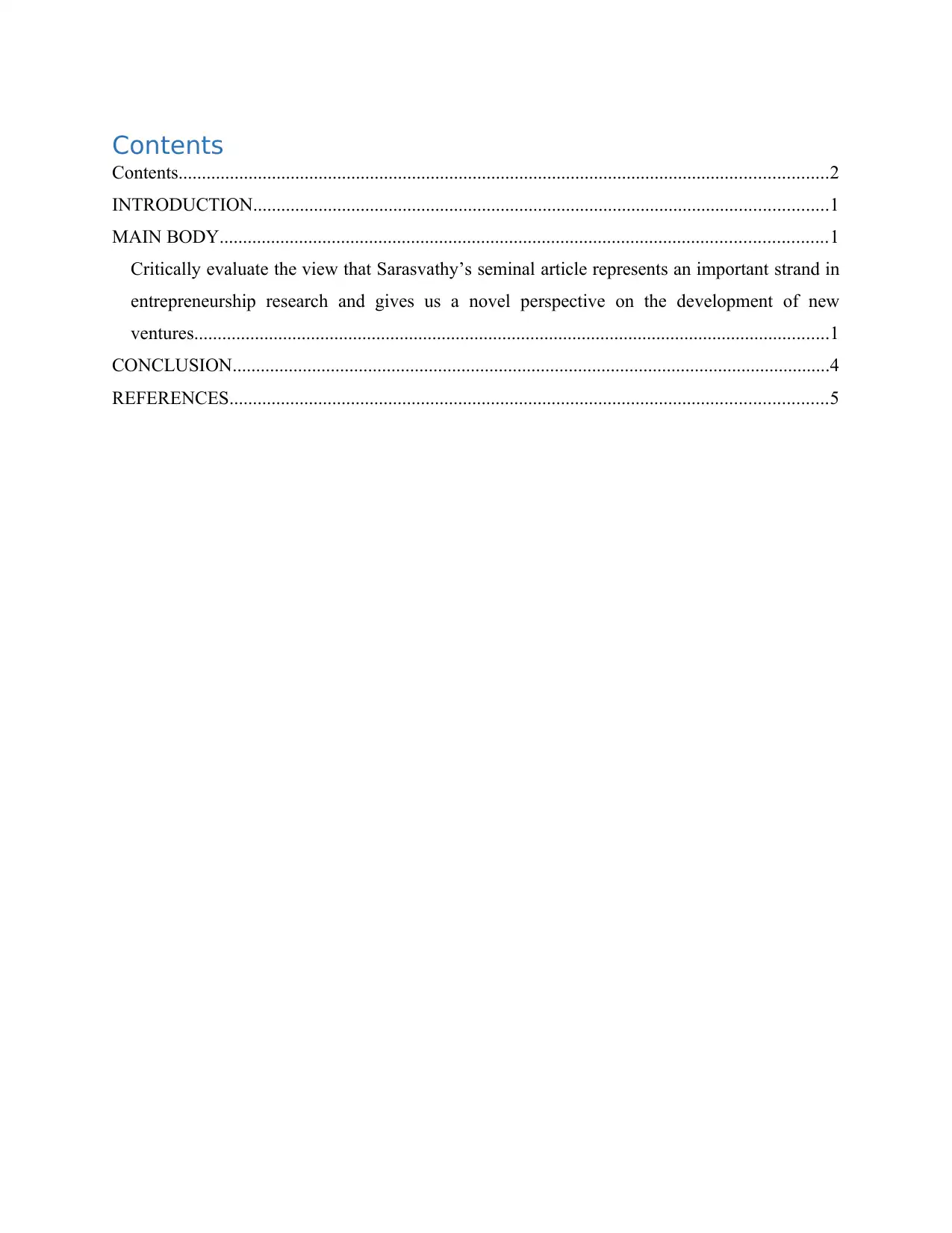
Contents
Contents...........................................................................................................................................2
INTRODUCTION...........................................................................................................................1
MAIN BODY..................................................................................................................................1
Critically evaluate the view that Sarasvathy’s seminal article represents an important strand in
entrepreneurship research and gives us a novel perspective on the development of new
ventures........................................................................................................................................1
CONCLUSION................................................................................................................................4
REFERENCES................................................................................................................................5
Contents...........................................................................................................................................2
INTRODUCTION...........................................................................................................................1
MAIN BODY..................................................................................................................................1
Critically evaluate the view that Sarasvathy’s seminal article represents an important strand in
entrepreneurship research and gives us a novel perspective on the development of new
ventures........................................................................................................................................1
CONCLUSION................................................................................................................................4
REFERENCES................................................................................................................................5
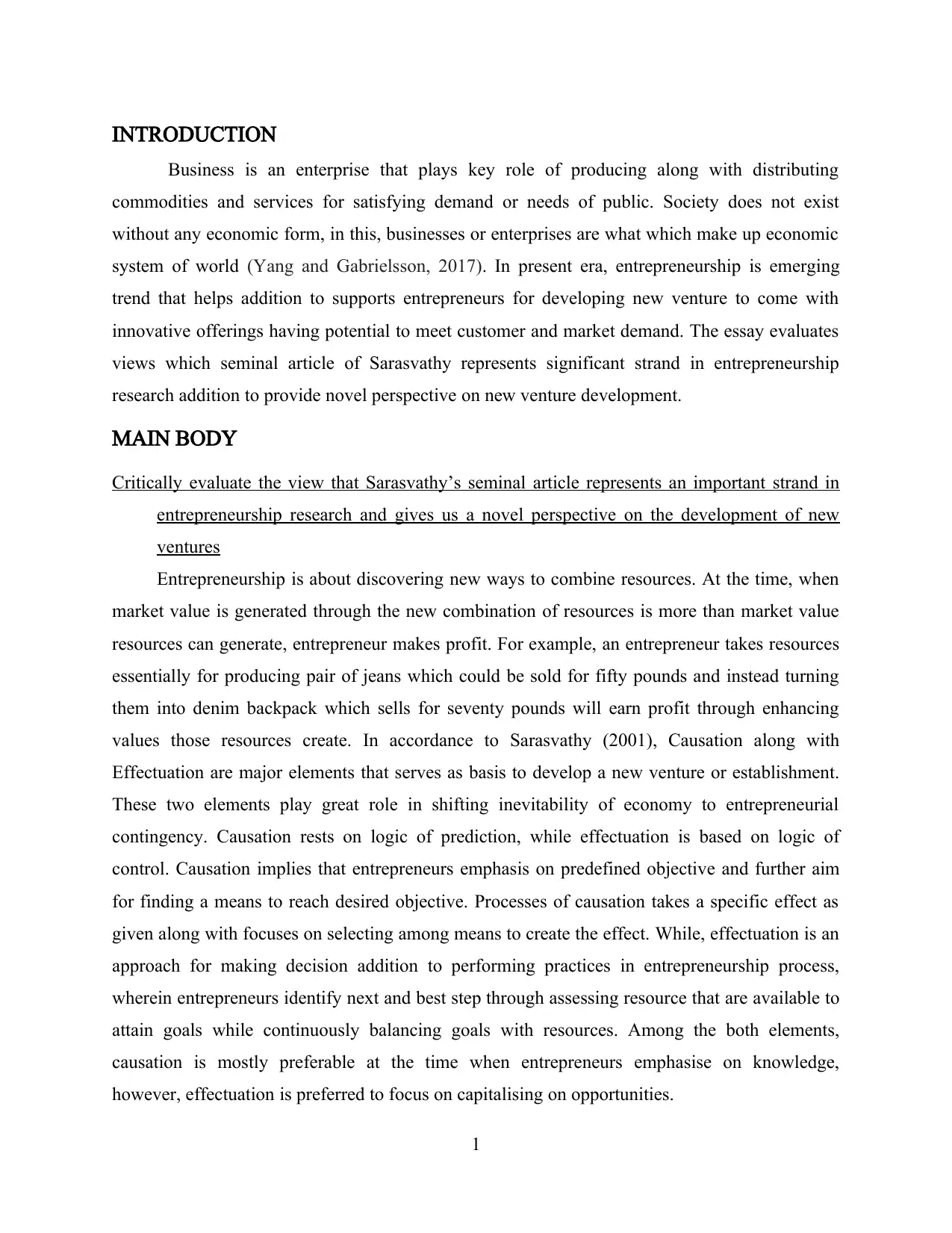
INTRODUCTION
Business is an enterprise that plays key role of producing along with distributing
commodities and services for satisfying demand or needs of public. Society does not exist
without any economic form, in this, businesses or enterprises are what which make up economic
system of world (Yang and Gabrielsson, 2017). In present era, entrepreneurship is emerging
trend that helps addition to supports entrepreneurs for developing new venture to come with
innovative offerings having potential to meet customer and market demand. The essay evaluates
views which seminal article of Sarasvathy represents significant strand in entrepreneurship
research addition to provide novel perspective on new venture development.
MAIN BODY
Critically evaluate the view that Sarasvathy’s seminal article represents an important strand in
entrepreneurship research and gives us a novel perspective on the development of new
ventures
Entrepreneurship is about discovering new ways to combine resources. At the time, when
market value is generated through the new combination of resources is more than market value
resources can generate, entrepreneur makes profit. For example, an entrepreneur takes resources
essentially for producing pair of jeans which could be sold for fifty pounds and instead turning
them into denim backpack which sells for seventy pounds will earn profit through enhancing
values those resources create. In accordance to Sarasvathy (2001), Causation along with
Effectuation are major elements that serves as basis to develop a new venture or establishment.
These two elements play great role in shifting inevitability of economy to entrepreneurial
contingency. Causation rests on logic of prediction, while effectuation is based on logic of
control. Causation implies that entrepreneurs emphasis on predefined objective and further aim
for finding a means to reach desired objective. Processes of causation takes a specific effect as
given along with focuses on selecting among means to create the effect. While, effectuation is an
approach for making decision addition to performing practices in entrepreneurship process,
wherein entrepreneurs identify next and best step through assessing resource that are available to
attain goals while continuously balancing goals with resources. Among the both elements,
causation is mostly preferable at the time when entrepreneurs emphasise on knowledge,
however, effectuation is preferred to focus on capitalising on opportunities.
1
Business is an enterprise that plays key role of producing along with distributing
commodities and services for satisfying demand or needs of public. Society does not exist
without any economic form, in this, businesses or enterprises are what which make up economic
system of world (Yang and Gabrielsson, 2017). In present era, entrepreneurship is emerging
trend that helps addition to supports entrepreneurs for developing new venture to come with
innovative offerings having potential to meet customer and market demand. The essay evaluates
views which seminal article of Sarasvathy represents significant strand in entrepreneurship
research addition to provide novel perspective on new venture development.
MAIN BODY
Critically evaluate the view that Sarasvathy’s seminal article represents an important strand in
entrepreneurship research and gives us a novel perspective on the development of new
ventures
Entrepreneurship is about discovering new ways to combine resources. At the time, when
market value is generated through the new combination of resources is more than market value
resources can generate, entrepreneur makes profit. For example, an entrepreneur takes resources
essentially for producing pair of jeans which could be sold for fifty pounds and instead turning
them into denim backpack which sells for seventy pounds will earn profit through enhancing
values those resources create. In accordance to Sarasvathy (2001), Causation along with
Effectuation are major elements that serves as basis to develop a new venture or establishment.
These two elements play great role in shifting inevitability of economy to entrepreneurial
contingency. Causation rests on logic of prediction, while effectuation is based on logic of
control. Causation implies that entrepreneurs emphasis on predefined objective and further aim
for finding a means to reach desired objective. Processes of causation takes a specific effect as
given along with focuses on selecting among means to create the effect. While, effectuation is an
approach for making decision addition to performing practices in entrepreneurship process,
wherein entrepreneurs identify next and best step through assessing resource that are available to
attain goals while continuously balancing goals with resources. Among the both elements,
causation is mostly preferable at the time when entrepreneurs emphasise on knowledge,
however, effectuation is preferred to focus on capitalising on opportunities.
1
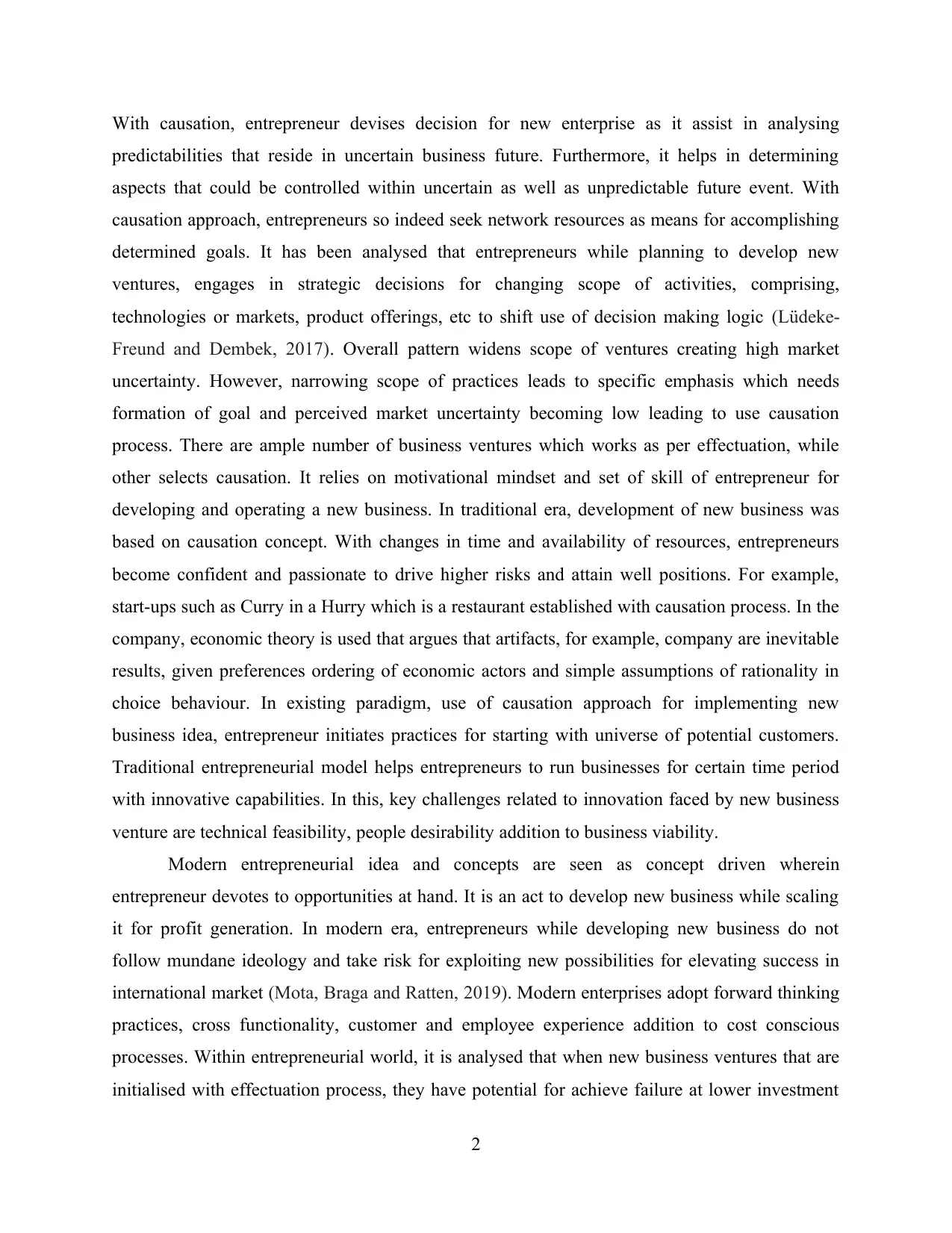
With causation, entrepreneur devises decision for new enterprise as it assist in analysing
predictabilities that reside in uncertain business future. Furthermore, it helps in determining
aspects that could be controlled within uncertain as well as unpredictable future event. With
causation approach, entrepreneurs so indeed seek network resources as means for accomplishing
determined goals. It has been analysed that entrepreneurs while planning to develop new
ventures, engages in strategic decisions for changing scope of activities, comprising,
technologies or markets, product offerings, etc to shift use of decision making logic (Lüdeke-
Freund and Dembek, 2017). Overall pattern widens scope of ventures creating high market
uncertainty. However, narrowing scope of practices leads to specific emphasis which needs
formation of goal and perceived market uncertainty becoming low leading to use causation
process. There are ample number of business ventures which works as per effectuation, while
other selects causation. It relies on motivational mindset and set of skill of entrepreneur for
developing and operating a new business. In traditional era, development of new business was
based on causation concept. With changes in time and availability of resources, entrepreneurs
become confident and passionate to drive higher risks and attain well positions. For example,
start-ups such as Curry in a Hurry which is a restaurant established with causation process. In the
company, economic theory is used that argues that artifacts, for example, company are inevitable
results, given preferences ordering of economic actors and simple assumptions of rationality in
choice behaviour. In existing paradigm, use of causation approach for implementing new
business idea, entrepreneur initiates practices for starting with universe of potential customers.
Traditional entrepreneurial model helps entrepreneurs to run businesses for certain time period
with innovative capabilities. In this, key challenges related to innovation faced by new business
venture are technical feasibility, people desirability addition to business viability.
Modern entrepreneurial idea and concepts are seen as concept driven wherein
entrepreneur devotes to opportunities at hand. It is an act to develop new business while scaling
it for profit generation. In modern era, entrepreneurs while developing new business do not
follow mundane ideology and take risk for exploiting new possibilities for elevating success in
international market (Mota, Braga and Ratten, 2019). Modern enterprises adopt forward thinking
practices, cross functionality, customer and employee experience addition to cost conscious
processes. Within entrepreneurial world, it is analysed that when new business ventures that are
initialised with effectuation process, they have potential for achieve failure at lower investment
2
predictabilities that reside in uncertain business future. Furthermore, it helps in determining
aspects that could be controlled within uncertain as well as unpredictable future event. With
causation approach, entrepreneurs so indeed seek network resources as means for accomplishing
determined goals. It has been analysed that entrepreneurs while planning to develop new
ventures, engages in strategic decisions for changing scope of activities, comprising,
technologies or markets, product offerings, etc to shift use of decision making logic (Lüdeke-
Freund and Dembek, 2017). Overall pattern widens scope of ventures creating high market
uncertainty. However, narrowing scope of practices leads to specific emphasis which needs
formation of goal and perceived market uncertainty becoming low leading to use causation
process. There are ample number of business ventures which works as per effectuation, while
other selects causation. It relies on motivational mindset and set of skill of entrepreneur for
developing and operating a new business. In traditional era, development of new business was
based on causation concept. With changes in time and availability of resources, entrepreneurs
become confident and passionate to drive higher risks and attain well positions. For example,
start-ups such as Curry in a Hurry which is a restaurant established with causation process. In the
company, economic theory is used that argues that artifacts, for example, company are inevitable
results, given preferences ordering of economic actors and simple assumptions of rationality in
choice behaviour. In existing paradigm, use of causation approach for implementing new
business idea, entrepreneur initiates practices for starting with universe of potential customers.
Traditional entrepreneurial model helps entrepreneurs to run businesses for certain time period
with innovative capabilities. In this, key challenges related to innovation faced by new business
venture are technical feasibility, people desirability addition to business viability.
Modern entrepreneurial idea and concepts are seen as concept driven wherein
entrepreneur devotes to opportunities at hand. It is an act to develop new business while scaling
it for profit generation. In modern era, entrepreneurs while developing new business do not
follow mundane ideology and take risk for exploiting new possibilities for elevating success in
international market (Mota, Braga and Ratten, 2019). Modern enterprises adopt forward thinking
practices, cross functionality, customer and employee experience addition to cost conscious
processes. Within entrepreneurial world, it is analysed that when new business ventures that are
initialised with effectuation process, they have potential for achieve failure at lower investment
2
Secure Best Marks with AI Grader
Need help grading? Try our AI Grader for instant feedback on your assignments.
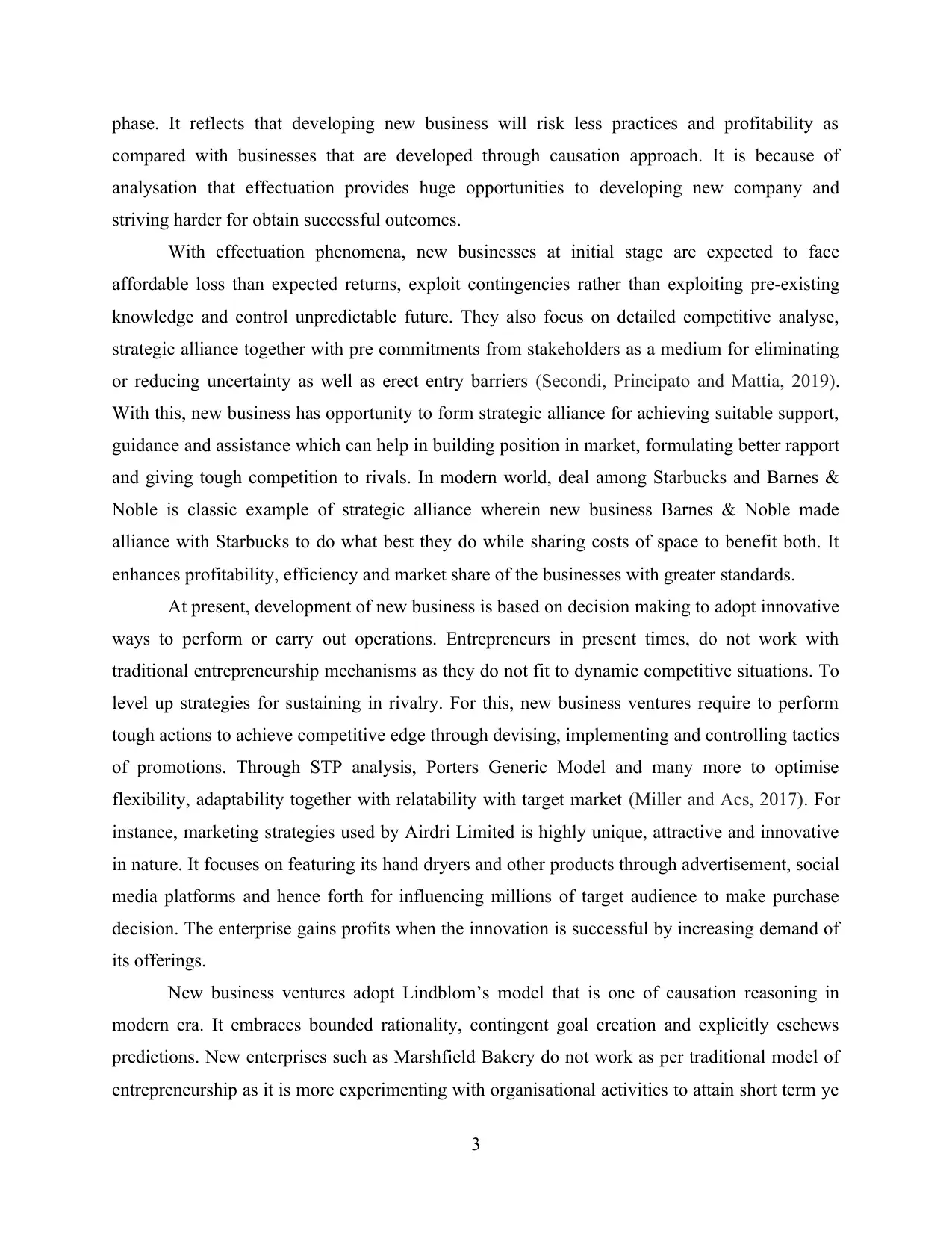
phase. It reflects that developing new business will risk less practices and profitability as
compared with businesses that are developed through causation approach. It is because of
analysation that effectuation provides huge opportunities to developing new company and
striving harder for obtain successful outcomes.
With effectuation phenomena, new businesses at initial stage are expected to face
affordable loss than expected returns, exploit contingencies rather than exploiting pre-existing
knowledge and control unpredictable future. They also focus on detailed competitive analyse,
strategic alliance together with pre commitments from stakeholders as a medium for eliminating
or reducing uncertainty as well as erect entry barriers (Secondi, Principato and Mattia, 2019).
With this, new business has opportunity to form strategic alliance for achieving suitable support,
guidance and assistance which can help in building position in market, formulating better rapport
and giving tough competition to rivals. In modern world, deal among Starbucks and Barnes &
Noble is classic example of strategic alliance wherein new business Barnes & Noble made
alliance with Starbucks to do what best they do while sharing costs of space to benefit both. It
enhances profitability, efficiency and market share of the businesses with greater standards.
At present, development of new business is based on decision making to adopt innovative
ways to perform or carry out operations. Entrepreneurs in present times, do not work with
traditional entrepreneurship mechanisms as they do not fit to dynamic competitive situations. To
level up strategies for sustaining in rivalry. For this, new business ventures require to perform
tough actions to achieve competitive edge through devising, implementing and controlling tactics
of promotions. Through STP analysis, Porters Generic Model and many more to optimise
flexibility, adaptability together with relatability with target market (Miller and Acs, 2017). For
instance, marketing strategies used by Airdri Limited is highly unique, attractive and innovative
in nature. It focuses on featuring its hand dryers and other products through advertisement, social
media platforms and hence forth for influencing millions of target audience to make purchase
decision. The enterprise gains profits when the innovation is successful by increasing demand of
its offerings.
New business ventures adopt Lindblom’s model that is one of causation reasoning in
modern era. It embraces bounded rationality, contingent goal creation and explicitly eschews
predictions. New enterprises such as Marshfield Bakery do not work as per traditional model of
entrepreneurship as it is more experimenting with organisational activities to attain short term ye
3
compared with businesses that are developed through causation approach. It is because of
analysation that effectuation provides huge opportunities to developing new company and
striving harder for obtain successful outcomes.
With effectuation phenomena, new businesses at initial stage are expected to face
affordable loss than expected returns, exploit contingencies rather than exploiting pre-existing
knowledge and control unpredictable future. They also focus on detailed competitive analyse,
strategic alliance together with pre commitments from stakeholders as a medium for eliminating
or reducing uncertainty as well as erect entry barriers (Secondi, Principato and Mattia, 2019).
With this, new business has opportunity to form strategic alliance for achieving suitable support,
guidance and assistance which can help in building position in market, formulating better rapport
and giving tough competition to rivals. In modern world, deal among Starbucks and Barnes &
Noble is classic example of strategic alliance wherein new business Barnes & Noble made
alliance with Starbucks to do what best they do while sharing costs of space to benefit both. It
enhances profitability, efficiency and market share of the businesses with greater standards.
At present, development of new business is based on decision making to adopt innovative
ways to perform or carry out operations. Entrepreneurs in present times, do not work with
traditional entrepreneurship mechanisms as they do not fit to dynamic competitive situations. To
level up strategies for sustaining in rivalry. For this, new business ventures require to perform
tough actions to achieve competitive edge through devising, implementing and controlling tactics
of promotions. Through STP analysis, Porters Generic Model and many more to optimise
flexibility, adaptability together with relatability with target market (Miller and Acs, 2017). For
instance, marketing strategies used by Airdri Limited is highly unique, attractive and innovative
in nature. It focuses on featuring its hand dryers and other products through advertisement, social
media platforms and hence forth for influencing millions of target audience to make purchase
decision. The enterprise gains profits when the innovation is successful by increasing demand of
its offerings.
New business ventures adopt Lindblom’s model that is one of causation reasoning in
modern era. It embraces bounded rationality, contingent goal creation and explicitly eschews
predictions. New enterprises such as Marshfield Bakery do not work as per traditional model of
entrepreneurship as it is more experimenting with organisational activities to attain short term ye
3
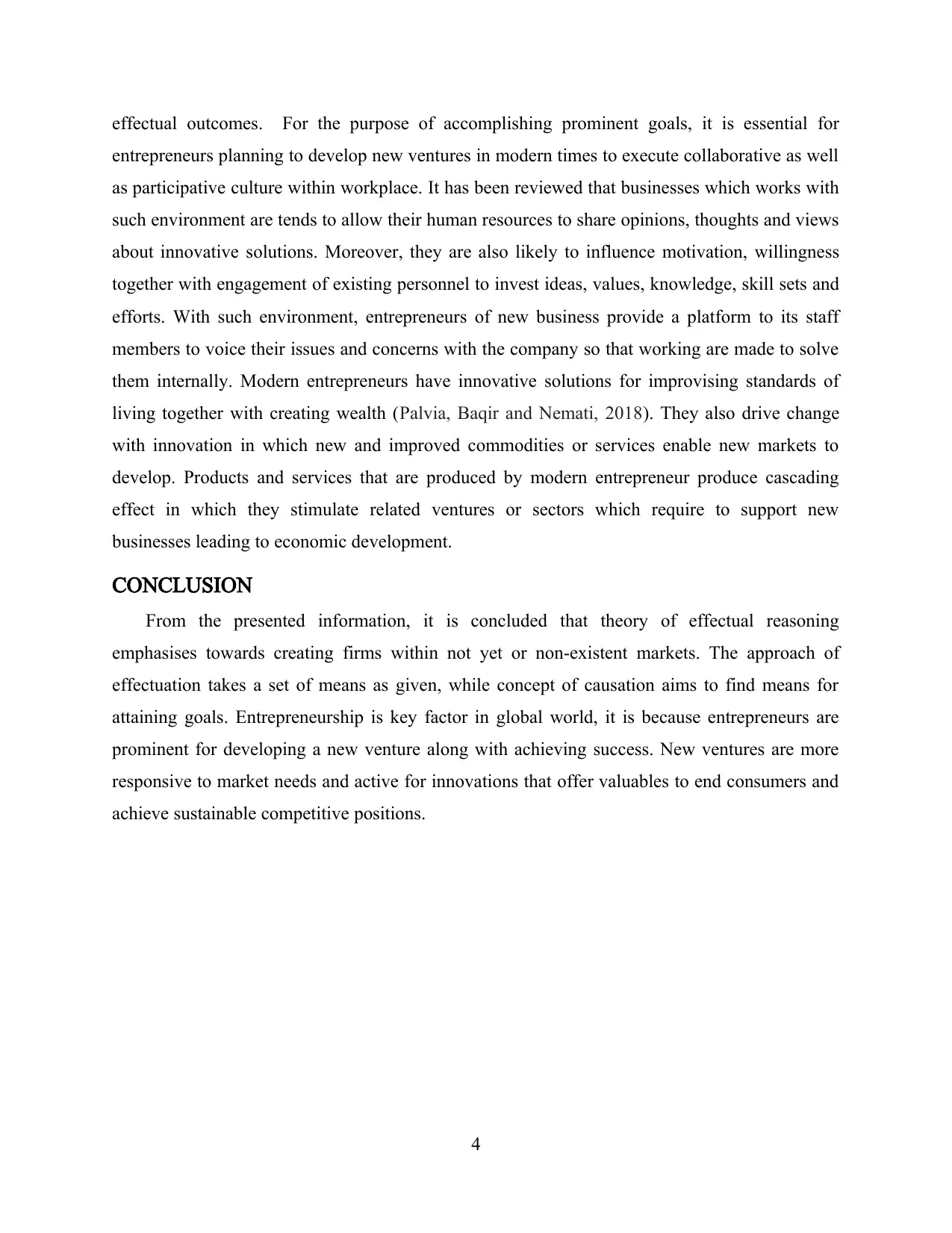
effectual outcomes. For the purpose of accomplishing prominent goals, it is essential for
entrepreneurs planning to develop new ventures in modern times to execute collaborative as well
as participative culture within workplace. It has been reviewed that businesses which works with
such environment are tends to allow their human resources to share opinions, thoughts and views
about innovative solutions. Moreover, they are also likely to influence motivation, willingness
together with engagement of existing personnel to invest ideas, values, knowledge, skill sets and
efforts. With such environment, entrepreneurs of new business provide a platform to its staff
members to voice their issues and concerns with the company so that working are made to solve
them internally. Modern entrepreneurs have innovative solutions for improvising standards of
living together with creating wealth (Palvia, Baqir and Nemati, 2018). They also drive change
with innovation in which new and improved commodities or services enable new markets to
develop. Products and services that are produced by modern entrepreneur produce cascading
effect in which they stimulate related ventures or sectors which require to support new
businesses leading to economic development.
CONCLUSION
From the presented information, it is concluded that theory of effectual reasoning
emphasises towards creating firms within not yet or non-existent markets. The approach of
effectuation takes a set of means as given, while concept of causation aims to find means for
attaining goals. Entrepreneurship is key factor in global world, it is because entrepreneurs are
prominent for developing a new venture along with achieving success. New ventures are more
responsive to market needs and active for innovations that offer valuables to end consumers and
achieve sustainable competitive positions.
4
entrepreneurs planning to develop new ventures in modern times to execute collaborative as well
as participative culture within workplace. It has been reviewed that businesses which works with
such environment are tends to allow their human resources to share opinions, thoughts and views
about innovative solutions. Moreover, they are also likely to influence motivation, willingness
together with engagement of existing personnel to invest ideas, values, knowledge, skill sets and
efforts. With such environment, entrepreneurs of new business provide a platform to its staff
members to voice their issues and concerns with the company so that working are made to solve
them internally. Modern entrepreneurs have innovative solutions for improvising standards of
living together with creating wealth (Palvia, Baqir and Nemati, 2018). They also drive change
with innovation in which new and improved commodities or services enable new markets to
develop. Products and services that are produced by modern entrepreneur produce cascading
effect in which they stimulate related ventures or sectors which require to support new
businesses leading to economic development.
CONCLUSION
From the presented information, it is concluded that theory of effectual reasoning
emphasises towards creating firms within not yet or non-existent markets. The approach of
effectuation takes a set of means as given, while concept of causation aims to find means for
attaining goals. Entrepreneurship is key factor in global world, it is because entrepreneurs are
prominent for developing a new venture along with achieving success. New ventures are more
responsive to market needs and active for innovations that offer valuables to end consumers and
achieve sustainable competitive positions.
4
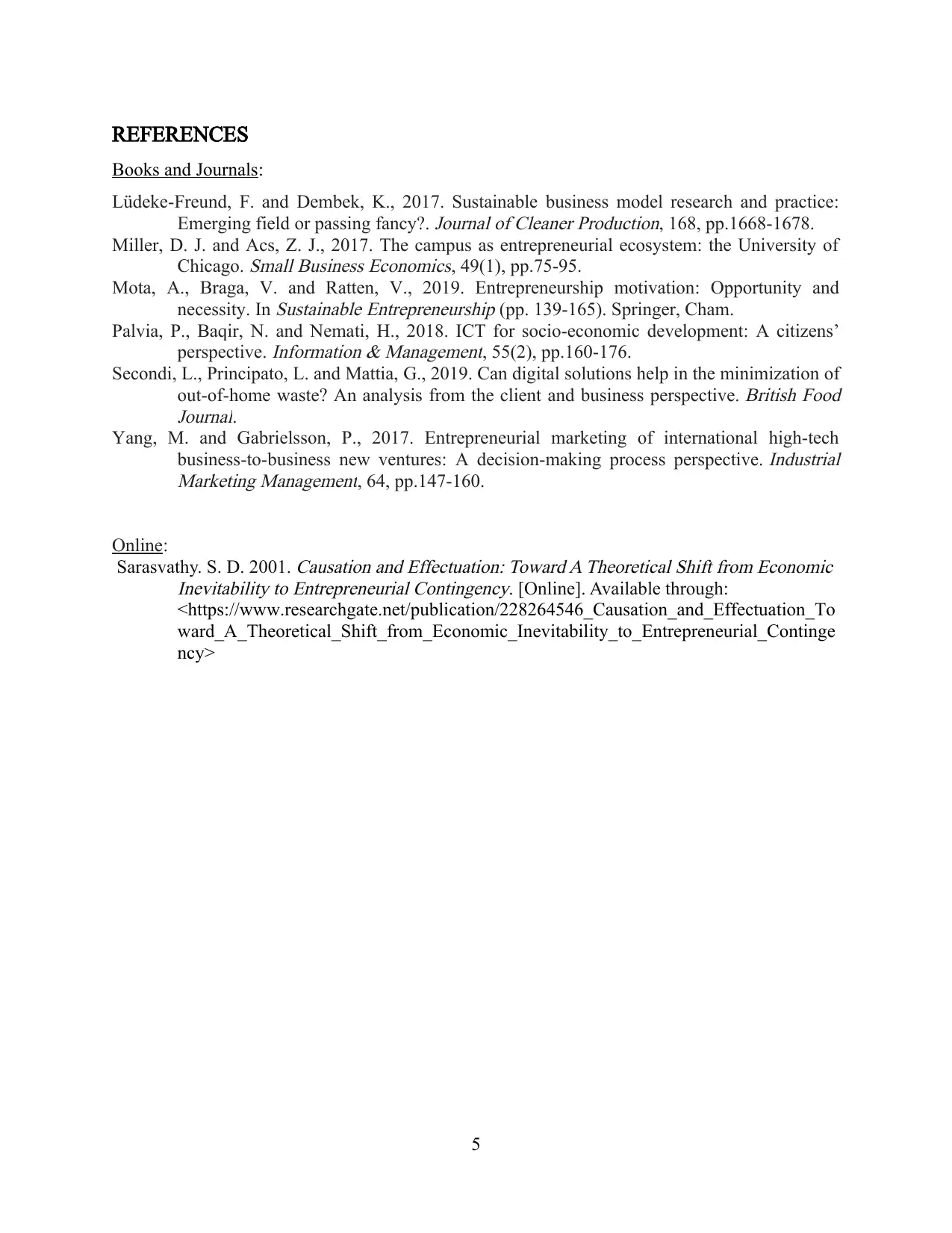
REFERENCES
Books and Journals:
Lüdeke-Freund, F. and Dembek, K., 2017. Sustainable business model research and practice:
Emerging field or passing fancy?.
Journal of Cleaner Production, 168, pp.1668-1678.
Miller, D. J. and Acs, Z. J., 2017. The campus as entrepreneurial ecosystem: the University of
Chicago.
Small Business Economics, 49(1), pp.75-95.
Mota, A., Braga, V. and Ratten, V., 2019. Entrepreneurship motivation: Opportunity and
necessity. In
Sustainable Entrepreneurship (pp. 139-165). Springer, Cham.
Palvia, P., Baqir, N. and Nemati, H., 2018. ICT for socio-economic development: A citizens’
perspective.
Information & Management, 55(2), pp.160-176.
Secondi, L., Principato, L. and Mattia, G., 2019. Can digital solutions help in the minimization of
out-of-home waste? An analysis from the client and business perspective.
British Food
Journal.
Yang, M. and Gabrielsson, P., 2017. Entrepreneurial marketing of international high-tech
business-to-business new ventures: A decision-making process perspective.
Industrial
Marketing Management, 64, pp.147-160.
Online:
Sarasvathy. S. D. 2001.
Causation and Effectuation: Toward A Theoretical Shift from Economic
Inevitability to Entrepreneurial Contingency. [Online]. Available through:
<https://www.researchgate.net/publication/228264546_Causation_and_Effectuation_To
ward_A_Theoretical_Shift_from_Economic_Inevitability_to_Entrepreneurial_Continge
ncy>
5
Books and Journals:
Lüdeke-Freund, F. and Dembek, K., 2017. Sustainable business model research and practice:
Emerging field or passing fancy?.
Journal of Cleaner Production, 168, pp.1668-1678.
Miller, D. J. and Acs, Z. J., 2017. The campus as entrepreneurial ecosystem: the University of
Chicago.
Small Business Economics, 49(1), pp.75-95.
Mota, A., Braga, V. and Ratten, V., 2019. Entrepreneurship motivation: Opportunity and
necessity. In
Sustainable Entrepreneurship (pp. 139-165). Springer, Cham.
Palvia, P., Baqir, N. and Nemati, H., 2018. ICT for socio-economic development: A citizens’
perspective.
Information & Management, 55(2), pp.160-176.
Secondi, L., Principato, L. and Mattia, G., 2019. Can digital solutions help in the minimization of
out-of-home waste? An analysis from the client and business perspective.
British Food
Journal.
Yang, M. and Gabrielsson, P., 2017. Entrepreneurial marketing of international high-tech
business-to-business new ventures: A decision-making process perspective.
Industrial
Marketing Management, 64, pp.147-160.
Online:
Sarasvathy. S. D. 2001.
Causation and Effectuation: Toward A Theoretical Shift from Economic
Inevitability to Entrepreneurial Contingency. [Online]. Available through:
<https://www.researchgate.net/publication/228264546_Causation_and_Effectuation_To
ward_A_Theoretical_Shift_from_Economic_Inevitability_to_Entrepreneurial_Continge
ncy>
5
1 out of 7
Your All-in-One AI-Powered Toolkit for Academic Success.
+13062052269
info@desklib.com
Available 24*7 on WhatsApp / Email
![[object Object]](/_next/static/media/star-bottom.7253800d.svg)
Unlock your academic potential
© 2024 | Zucol Services PVT LTD | All rights reserved.


